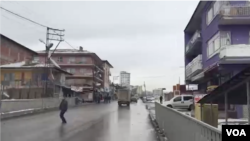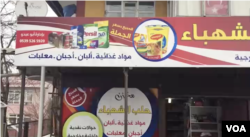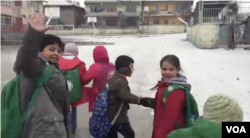The Siteler neighborhood in Ankara, Turkey, is known as a Syrian neighborhood these days. It is filled with Syrian refugees who have fled violence in their homeland.
A majority of the shanty houses here were demolished. Those that remain are used by Syrians. Most do not have hot water or central heating, but the neighborhood seems safe.
On the main road through the neighborhood, Selcuk Street, from the barbershop to the butcher, Arabic signs catch one's eye.
The prices of the products and services in those shops seem cheaper than in the rest of Ankara. This is most likely because taxes are not charged. Either they don't have cash registers, or there are no tax certificates displayed in the shops.
Nene Hatun Elementary School in the neighborhood has both Turkish and Arabic curricula for Syrian kids. Most of Nene Hatun's Turkish students were transferred to a different school in an adjacent neighborhood. The Syrian students use backpacks sent by Saudi Arabia. They all seem to speak Turkish far better than their parents.
Twelve-year-old Muhammed is a third-grader at Nene Hatun. Like his friends Hamza and Betul, Muhammed and his family came from Aleppo. Muhammed and Hamza say they don't want to go back to Syria, but Betul shyly says she does.
Just a couple meters away is a tiny restaurant owned by Semar Amar. He also came to Ankara from Aleppo, with his wife and their two children. He opened the restaurant two years ago, as soon as he arrived. He says business is good, and he doesn't want to go back to Syria. He pays 600 Turkish liras for his monthly rent, makes 1,200 liras as revenue, and says he does not pay taxes for his restaurant.
Anad Ahmad, 19, who helped translate for Amar, came to Turkey by himself, leaving his family behind. He works at a furniture shop, and he said he does not think of leaving Turkey either.
Women in the neighborhood refrain from talking to journalists with cameras. An older woman wants a wheelchair for her son who lost a leg in the Syrian war. She calls him a "mujahidin." Many women go out to the streets wearing black abayas. They all refrain from answering questions about Syria.
They say Turkey is their new home now.






